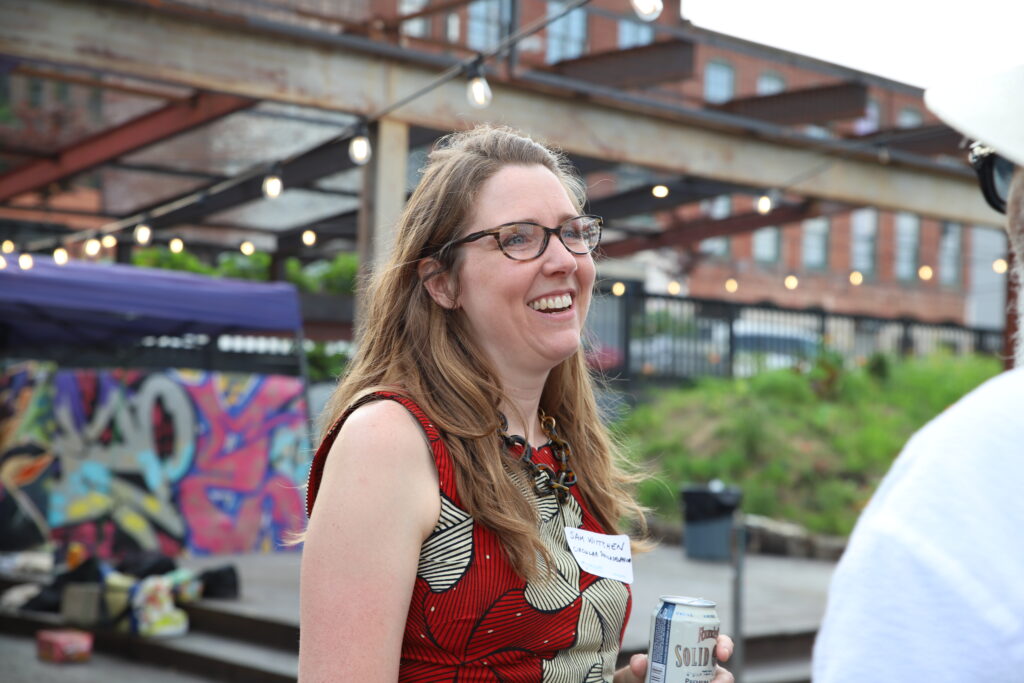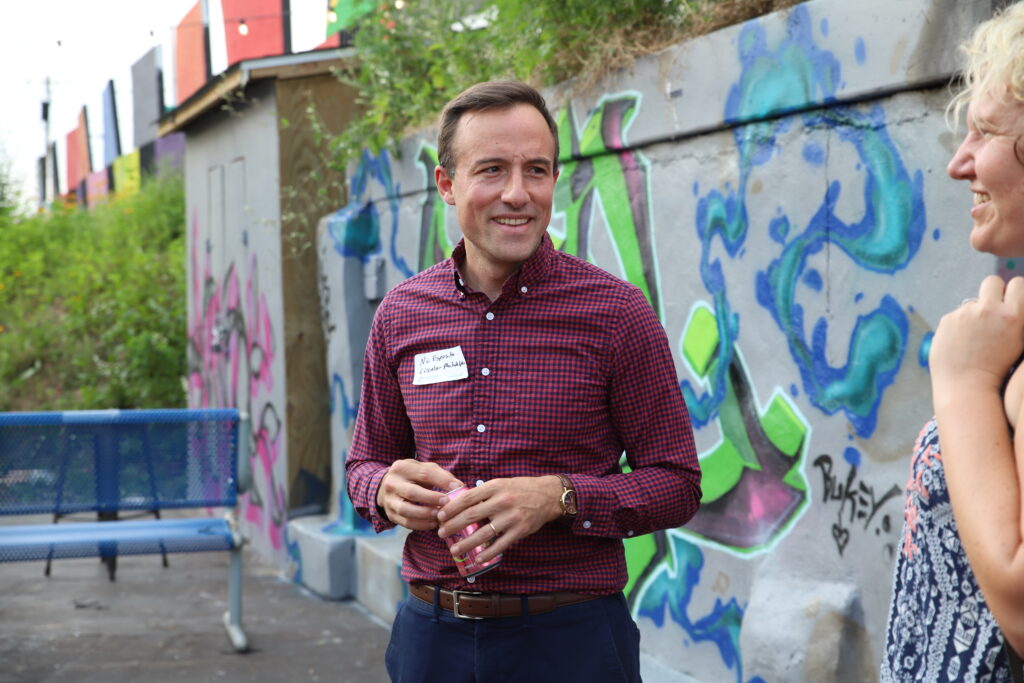When Samantha Wittchen, Nic Esposito, and Julie Hancher launched Circular Philadelphia last June, the founders knew there were already plenty of circular economy thought-leaders and think tanks. But instead of saying, “Wouldn’t it be great if we had a circular economy?” they wanted to ask, “How do you make things happen in a place like Philadelphia?”
The economy they imagine would develop systems that let us use, collect, sort, and recycle or repurpose our everyday materials on a large scale. This would replace the world of single-use items we buy and throw away, from food containers to this season’s fashions to demolished buildings. And yes, a lot of that work is what Wittchen calls “a big, hairy, audacious goal.”

Now Circular Philadelphia’s director of programs and operations, Wittchen says the organization’s spark came in 2019, when she penned an article for Grid Magazine about the city burning its recycling. The piece opened a dialogue between Wittchen and Esposito, who was Philly’s Zero Waste and Litter Cabinet director at the time.
“He did not disagree with some of my complaints, but said we need to look at this with a bigger picture,” recalls Wittchen.
The following year, the city’s pandemic budget eliminated Esposito’s job, and he too began writing about the problem from the outside, penning a summer 2020 Philadelphia Citizen piece about the city’s trash crisis.
Meanwhile, Wittchen had been “agitating” for a dedicated organization to push the city forward on reforming its waste management. She sent Esposito a message on LinkedIn: “Hey, now that you’re on the outside, can we get something started?”
We have no illusions that this isn’t a big job.Samantha Wittchen, Circular Philadelphia
They met up in August 2020, and Wittchen credits Esposito with targeting the broader goal of promoting not just less waste, but a circular economy. They spent the next several months researching programs in other cities. They also began talking to local businesses already testing circular practices about whether they needed additional advocacy, “and the answer we got, over and over, is yes. We need this organization to exist here, please make it happen,” she recalls.
In spring 2021, Circular Philadelphia officially incorporated as a nonprofit; they launched with an outdoor event in June.
The organization is an ambitious multi-tiered advocacy platform. They’re already going to bat for local groups who need the city to reduce bureaucratic hurdles to circular principles. They’re educating the public. And they’re boosting businesses that are putting these principles to work.
One of their first programs is the Circular Scavenger Hunt, launched in partnership with Mural Arts’ Trash Academy. It’s an online form consumers can fill out when they notice Philly businesses with policies such as selling in bulk, composting, allowing customers to bring their own coffee mugs, or renting goods and services (like tool libraries). Circular Philadelphia wants to develop a directory of places that are already in the circular economy.

“Plenty of businesses that you frequent regularly are already doing some of these things,” says Wittchen. So participating in a circular economy today “is not going to make things more difficult for you,” and it will benefit local businesses in the process.
Circular Philadelphia’s initial focus areas include the built environment, textiles, and food systems. Each is its own mammoth challenge, but with actionable steps for sustainability.
The nonprofit has already achieved one policy success: It helped Tiffin, a popular Philly-area Indian restaurant chain, continue to offer reusable take-out containers. City policy originally required a variance and fee for offering reusable containers; it was changed to incorporate the container systems into existing health inspections.
“As a business, Tiffin doesn’t have the bandwidth to go through the advocacy for removing the barriers” to reusable containers, Wittchen explains. That’s where Circular Philadelphia can step in.
The organization is also boosting awareness in the construction sector about a little-known L&I permit that allows developers to get a start on non-structural interior deconstruction — preserving potentially reusable elements like doors, trim, flooring, and windows — before full-on demolition, which often results in useful materials being sent to landfill.
Wittchen calls textiles “the most intractable of our problems,” locally and globally. That’s partly because fast fashion is usually made with mixed fibers, which are hard to separate and reuse. Plenty of Philly businesses do recycle clothing via thrift or consignment shops, but it’s not enough.
One of Circular Philadelphia’s big dreams is a textile recycling facility in the region, and it’s partnering with All Together Now PA to map these facilities around the country. For now, the job is to quantify the size of the textile waste problem here.

Other major goals include overhauling the city’s current trash collection systems — no recycling or reuse effort can succeed before a system exists to collect the material. It’s become particularly obvious since the pandemic that our city’s collection system is in crisis.
Wittchen points to the need for city waste systems with a digital component, a strong planning function versus reactive policy, and better thinking about what the city can do in-house versus hiring outside contractors (as for textile or electronic waste). We also need better treatment for sanitation workers, Wittchen insists: Nothing will happen if the workers themselves aren’t on board.
“We have no illusions that this isn’t a big job,” says Wittchen of Circular Philadelphia’s policy and advocacy goals, especially since they’re committed to serving everyone. “A lot of the issues the circular economy can solve, [such as] less litter, less pollution, disproportionately affect Black and brown communities. They need to be part of the conversation at the beginning.”
For now, Circular Philadelphia is primarily funded through its membership program, which has tiers for individuals and organizations. In the future, they hope to balance memberships and sponsorships with grants and contract work, including market research and consulting. Anyone interested in the mission can sign up for a membership or volunteer.
“The point that I’m always trying to hammer home is that our goal is to actually advance this,” says Wittchen. “We want to make sure that this actually happens.”
ALAINA JOHNS is a Philadelphia-based freelance writer and the Editor-in-Chief of BroadStreetReview.com, Philly’s hub for arts, culture and commentary.

